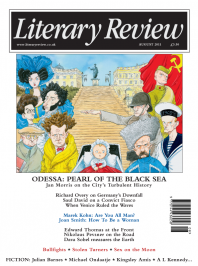Alex Renton
Out To Lunch
Dishing it Out: In Search of the Restaurant Experience
By Robert Appelbaum
The first commercial eating place called a restaurant opened in Paris in the 1760s. Then, as now, the very name was a promise – restaurant, a restoring or refreshing thing. Of course the name only tells you about one part of the deal offered when you walk in, whether to McDonald’s or Nobu. It’s what you do while restoring that makes restaurant-going so universally popular: the talk, the imbibing, the intrigue, the flirtation, and the adventure. We’re ‘lovin’ it’, as they inform you under the yellow arches, and I dare say we always have. Ever since man first cooked mammoth and sold the steaks, the warm space around the hearth has been a haven for the hungry and the bored; a place to be nourished, entertained and seduced, without having to cook or do the washing up.
According to Robert Appelbaum, by the time of the French Revolution there were a hundred restaurants in Paris. By 1803, ‘the restaurant had become not only a common institution, but a cultural idea … a subject of discourse’. I suspect they were that 2,000 years earlier as well:

Sign Up to our newsletter
Receive free articles, highlights from the archive, news, details of prizes, and much more.@Lit_Review
Follow Literary Review on Twitter
Twitter Feed
It wasn’t until 1825 that Pepys’s diary became available for the first time. How it was eventually decrypted and published is a story of subterfuge and duplicity.
Kate Loveman tells the tale.
Kate Loveman - Publishing Pepys
Kate Loveman: Publishing Pepys
literaryreview.co.uk
Arthur Christopher Benson was a pillar of the Edwardian establishment. He was supremely well connected. As his newly published diaries reveal, he was also riotously indiscreet.
Piers Brendon compares Benson’s journals to others from the 20th century.
Piers Brendon - Land of Dopes & Tories
Piers Brendon: Land of Dopes & Tories - The Benson Diaries: Selections from the Diary of Arthur Christopher Benson by Eamon Duffy & Ronald Hyam (edd)
literaryreview.co.uk
Of the siblings Gwen and Augustus John, it is Augustus who has commanded most attention from collectors and connoisseurs.
Was he really the finer artist, asks Tanya Harrod, or is it time Gwen emerged from her brother’s shadow?
Tanya Harrod - Cut from the Same Canvas
Tanya Harrod: Cut from the Same Canvas - Artists, Siblings, Visionaries: The Lives and Loves of Gwen and Augustus John by Judith Mackrell
literaryreview.co.uk